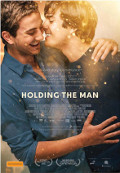
Directed by
Neil Armfield
128 minutes
Rated MA
Reviewed by
Chris Thompson

Holding The Man
Synopsis: Timothy Conigrave (Ryan Corr) and John Caleo (Craig Stott) fall in love while teenagers at their all-boys high school where John is the captain of the football team and Tim is discovering theatre and acting. Over the next 15 years, their relationship survives periods of happiness, turmoil, jealousy, prejudice, and the pressures of families that can’t easily accept who they are. Eventually, though, they come up against the one thing their love cannot overcome - the diagnosis that they are both HIV-positive.Neil Armfield is a versatile director who brings his great skills in storytelling to any medium to which he puts his exceptionally creative mind; be it in iconic theatre productions like "Cloudstreet" or "Waiting for Godot" or in the epic opera of Wagner’s Ring Cycle or up there on the big screen with films like Candy (2005) or this, his latest offering. And even though this material might be as tragic as the story of Candy, Armfield opts for a lighter touch here which swiftly brings us into the romance and sets us up for the impact of the darker moments that are to come. But the achievement of this film is not a singular effort.
Holding The Man comes to the screen with a pretty good pedigree, sired by Tim Conigrave’s own award winning memoir by way of Tommy Murphy’s multi-award-winning stage play. Like Lantana (2001) by fellow playwright and screenwriter, Andrew Bovell, Tommy Murphy’s screen adaptation of his play manages to distil the narrative essence of the work without succumbing to the kind of staginess that often dogs the journey from the stage to the screen. Much of this strength comes from the visual power of Germain McMicking‘s cinematography and Dany Cooper’s editing which serves the story so well in its many clever juxtaposed images and scene transitions. The soundtrack, too, is an important factor here. The story is set in the 70s, 80s and 90s and the clever selection of songs from those eras serves not only to place us squarely in the period, but offers lyrical resonances with the narrative and the characters without hitting us over the head with the ‘message’.
But, in the end, a tragic love story lives or dies by the spark that the actors create on screen and the performances by Corr and Stott are outstanding in their ability to offer us emotional authenticity, genuine affection and romance plus that little something extra that seems to light up the screen when they are together.
It’s perhaps a credit to Armfield’s pulling power that the cast as a whole is seasoned with some of Australia’s most skilled actors. Anthony Lapaglia and Camilla Ah Kin are excellent as Caleo’s parents with Lapaglia particularly strong as the father who can’t reconcile with the truth about his son. Kerry Fox and Guy Pearce play Conigrave’s more moderate parents and, even though her talents seem underused here, the wonderful Sarah Snook still shines through as Pepe Trevor, one of the first and most accepting of their mutual friends. Even Geoffrey Rush pops up in a tiny role as the Head of Acting at NIDA. But it’s in the smaller roles that we reap the benefit of a cast that calls on the collective talents of performers like Marco Chiappi, Maria Theordorakis, Mitchell Butel, Marcus Graham and Julie Forsythe – actors perhaps better known to the stage and the small screen but whose calibre of craft provides a solid foundation upon which the film can be built.
In the end, though, it’s in the visual storytelling that this film excels, from the palpable lust we see in the opening scenes of Conigrave watching Caleo on the football field to the sublime dance-floor scene at Conigrave’s sister’s wedding which expresses more in a couple of minutes of beautifully-directed imagery than a lesser film might try in several pages of dialogue. Who says Australia can’t make great films?

Want more about this film?


Want something different?




